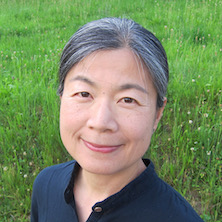
Yuriko Sato, MD
Praxis zum Innenhof
+41 41 508 56 33
Mühlegasse 23
8001 Zürich
Switzerland
Therapie3
Aarbergergasse 14
3011 Bern
Switzerland
Training/Supervising Analyst
Swiss Certified Psychotherapist
Yuriko Sato is a Japanese Jungian analyst and psychotherapist, and a graduate of the C.G. Jung Institute Zürich. She studied medicine and worked as a psychiatrist in Osaka and Kyoto. She came back to Switzerland and joined ISAP in 2007. She is training/supervising analyst at ISAPZURICH, where she teaches on topics such as the Eastern (Japanese) psyche, narcissism, and psychiatry.
Education
Medical Doctor, 1991, Shiga University of Medical Science (Japan)
Professional Organizations
ASP (Association of Swiss Psychotherapists)
AGAP (Association of Graduates in Analytical Psychology)
IAAP (International Association for Analytical Psychology)
Psychologischer Club Zürich
AJAJ (Association of Jungian Analysts, Japan)
JSPN (Japanese Society of Psychiatry and Neurology)
Languages Spoken
Japanese
English
German
Age Groups
Adults
Adolescents
Children
Treatment Types
Individuals
Specialties
Dream Interpretation
Fairy Tales
Spirituality/Religion
Ethnology
Psychiatry
Lectures and Publications
2019 June
Pari Center for New Learning: Re-enchanting the World, Italy
The Sense of Wonder: Being Connected with the Enchanted World
Published in Pari Perspectives 1, 9-13 (2019)
2018 November
CONFER Small Earth Conference, England
Beyond Materialism
2017 November
C.G. Jung Club London, England
“Mottainai” A Japanese sense of Anima Mundi
2017 October
Psychologischer Club Zürich, Switzerland
Shinto: Japanese Sense of Anima Mundi in the Modern Psyche
2016 August
IAAP XX International Congress for Analytical Psychology, Japan
“Mottainai” A Japanese sense of Anima Mundi
Published in Proc. Twentieth Congress of the International Association for Analytical Psychology, Daimon Verlag, 805-812 (2017)
Published in The Journal of Analytical Psychology (2017, 62, I. 147-154)

